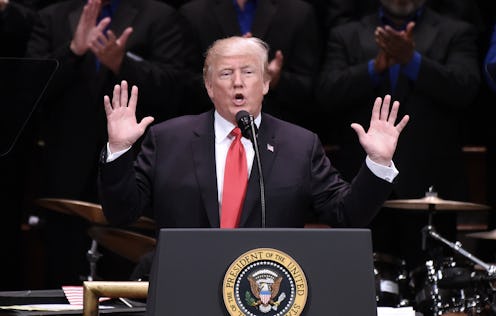News
Trump's Voter Fraud Commission May Have Broken The Law

Alongside growing concerns that the commission investigating voter fraud in the 2016 presidential election could ultimately lead to the suppression of legal votes, The Hill reported on Wednesday that Trump's voter fraud commission may have broken the law itself. However, the White House has strongly denied such claims.
The reason might seem dry at first, but it proves to be a bit of bureaucratic magic. As experts told The Hill, the Presidential Advisory Commission on Election Integrity didn't abide by federal requirements because it ignored the certain channels for requesting information from all 50 states. And, to make matters worse, the requests asked for voter information that included names, addresses, party registrations, and the last four digits of voters' social security numbers.
The commission's error, the experts claimed, was failing to submit its requests through the Office of Management and Budget's Office of Information and Regulatory Affairs (OIRA). They argued that, because of that misstep, the commission could have violated the Paperwork Reduction Act (PRA) of 1980.
Furthermore, the misstep could also give states the leeway to claim that they don't have to respond. As former OIRA administrator (and director of the GW Regulatory Studies Center at George Washington University) Susan Dudley told The Hill:
If the commission gets heavy-handed with them, it seems to me that the states are within their right to say, "No, we don't have to respond because you didn't go through [OIRA]."
The White House responded to The Hill's allegations later on Wednesday, with a spokesman arguing that the commission wasn't required to follow the PRA because it was not a federal agency. As Marc Lotter, spokesman for Vice President Mike Pence wrote in an email to The Hill:
The Paperwork Reduction Act only applies to information collections by agencies. The Commission is an entity that "serve[s] solely to advise and assist the President," and is not, therefore, an agency subject to PRA.
However, The Hill also reported that its experts believe a 1995 amendment to the 1980 PRA would, in fact, extend the authority of OIRA to include requests for the government and the public (and, thus, would include Trump's commission.)
The commission was formed in May after the president signed an executive order vowing to look into the election fraud that he claimed was rampant in the United States (though those claims have been deemed "unfounded" by most media outlets and experts). The president also claimed that he only lost the popular vote in the 2016 due to that voter fraud. Meanwhile, Trump's critics have voiced concerns over how the investigations into these unfounded claims could hinder the fairness of elections more than they might help.
As a considerable amount of states (at least 44 out of 50, plus the District of Columbia, as of Wednesday night) have already pushed back against the commission's requests for such extensive voter data, the added administrative debate insures yet another obstacle.